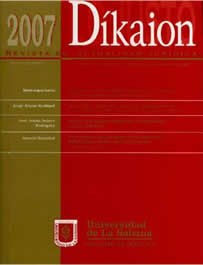El maniaco del unísono. Una crítica al positivismo por su reduccionismo epistemológico
Abstract
All along human history, it can be observed the constant oscillation between different scientific theories. This can be proved, for example, by reflecting on the evolution of some philosophic ideas since the end of the middle Ages up to the present time. Moreover, this phenomenon brings to the surface a basic characteristic of human condition: insecurity. One, which generates the option for simplistic and “pure” solutions, and culminates, in many cases, in a defective approach to reality.
The scientific problem which states epistemological reductionism is that, as it omits the existential dimension of human life, is incapable to give satisfactory answers to resolve conflicts.
This fault is suffered by legal positivism –in the same way that naïf iusnaturalism, before– because of its impossibility to resolve real legal conflicts. Impossibility, that finds it roots in a pretended non-valorative approach, and gives place to two kinds of reductionism: the one which ignores sharply the valuations and the other that recognizing them, but arbitrarily chooses the values (or “the value”) object of its knowledge.
Downloads
Downloads
How to Cite
Issue
Section
License
1. Proposed Policy for Journals That Offer Open Access
Authors who publish with this journal agree to the following terms:
This journal and its papers are published with the Creative Commons License Attribution-NonCommercial-NoDerivatives 4.0 International (CC BY-NC-ND 4.0). You are free to share copy and redistribute the material in any medium or format if you: give appropriate credit, provide a link to the license, and indicate if changes were made; don’t use our material for commercial purposes; don’t remix, transform, or build upon the material.






